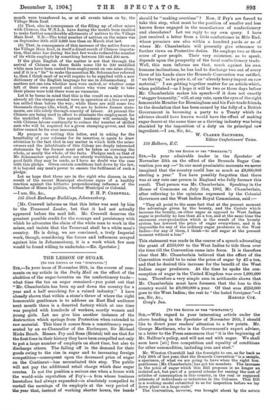vention you say :—" In our most pessimistic moments we
never imagined that the country could lose as much as 28,000,000 sterling a year." You have possibly forgotten that there was at any rate one person in England who fully foresaw this result. That person was Mr. Chamberlain. Speaking in the House of Commons on July 31st, 1902, Mr. Chamberlain, after referring to the opinions expressed by the Colonial Governors and the West Indies Royal Commission, said :—
"They all point to the same fact that at the present moment the advantage given by the bounty, and the Cartels which increase the bounty, on other sugar as opposed to West Indian sugar is probably no less than £5 a ton, and at the same time the enormous over-production which is the result of the bounty system has lowered the price of sugar everywhere, and it is impossible for any of the ordinary sugar producers in the West Indies—for any of them, I think—to sell sugar at the present moment without a loss."
This statement was made in the course of a speech advocating
the grant of 2250,000 to the West Indies to tide them over the time till the Convention came into force. It is therefore clear that Mr. Chamberlain believed that the effect of the Convention would be to raise the price of sugar by 25 a ton, and that he desired this increase for the benefit of the West Indian sugar producers. At the time he spoke the con- sumption of sugar in the United Kingdom was over 1,600,000 tons. Therefore a very simple sum in arithmetic shows that Mr. Chamberlain must have foreseen that the loss to this country would be 28,000,000 a year. Of that suns 2250,000 goes to the West Indies; the rest to "the hated foreigner."—I
HAROLD COY.
am, Sir, Ste., Gray's inn. [TO THE EDITOR. OF TRH "SPECTFATOR:1






































































 Previous page
Previous page